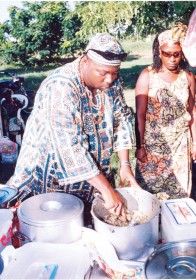Arts On Sunday

The troubled Trinidadian poet Eric Roache was seriously tormented by the gathering dark clouds of Black Power in 1970 and the new emerging poets in the Caribbean “wallowing in the murky waters of race and slavery” (Roache killed himself in 1974). Yet that same Eric Roache wrote a powerful poem called Verse in August in which he lamented the wane of strong African traditions, including stickfighting that used to swing into action every year at Emancipation celebrations in August. He regretted that young Trinidadian men neither remembered nor cared, and the legacy of African culture left by the emancipated Africans, once preserved in the verse in August, might be lost.

Glimmers of hope brightened the horizon in Jamaica at the threatened dusk of these Emancipation traditions when many of them were drawn in as a part of festival to celebrate Independence on August 6. The timing was fortunate since, while Emancipation Day is August 1, many insist it is ‘August Monday,’ the first Monday in the month as in the traditional Gumbay song Aagus Maanin (August Morning).
The song accompanies the Bruckins dance tradition, performed by an appropriately costumed king and queen in celebration of emancipation. But to what extent do the present-day inheritors of this legacy understand the significance of this performance which is effectively a celebration of the Golden Jubilee of Queen Victoria, in praise of her who “set we free”? How much does Eric Roache’s lost generation appreciate of these surviving relics of Emancipation?
In Guyana there is an annual emancipation festival put on by an organization called the African Cultural and Development Association (ACDA) to celebrate the anniversary on August 1.
There are vigils, libation ceremonies, performances, games and other activities in many of the villages, including some of those that are virtual monuments of Emancipation because they were settled, purchased and developed by the people in the post-Emancipation village movement. There is the tradition of a ‘Soiree’ in Hopetown or Lichfield which has neither been consistent or culturally informative in recent years.
However, just as in Roache’s verse, we are confronting waning traditions, very little knowledge and people who do not do enough to preserve, revive, research or understand the powerful Emancipation traditions that are or were their heritage. The festival in the National Park has not fully made the transformation into a truly national event. It started out in the 1980s as ‘The GBC Folk Festival,’ and in its early years made some attempt to draw out surviving practices in Guyanese African culture. Today it does not exhibit enough of any of the artistic or performance traditions, the social customs or information about this culture in Guyana.
University of Guyana lecturer and former Dean John Carty Caesar has performed the libation at some of the ceremonies in past years and his rituals were taken from those known in Ghana. But how many of the genuine African rituals that used to be practised in Guyana are known and performed in the various ceremonies? Although there is a wealth of relevant cultural practices in many of the villages, a researcher will gain very little from observing the activities on Emancipation Day or at the vigils on its eve, because the practitioners do not really know them. Today’s Soirees are ordinary street parties with no indigenous cultural character.
There is much to celebrate in Guyana in the context of the cultural heritage of Emanci-pation; the African survivals/vestiges/continuities and influences; the performance traditions, religious rituals and social institutions. The social and political history of slavery and the post-emancipation evolutions including derivations from African culture, creolised and hybrid forms have made very significant contributions to the Guyanese culture and nation.
However, to a large extent they are not known and have to be researched. There is no institution outside of a few researchers at the University of Guyana, in its School of Humanities, Linguistics, Literature and the Division of History, the Faculty of Social Sciences and Centre for Communication Studies, devoted to this kind of study. There is no cultural organisation or private sector sponsorship that supports or sustains research into African culture in Guyana.
Furthermore, there has been a good deal of normal cultural change that is a factor in any society and this has accounted for significant reductions. Added to that is cultural diffusion, a watering down of indigenous culture that comes from people’s attitudes and willingly accepted foreign cultural penetration. Emancipation does not only mean freedom from slavery, it also has to do with mental liberation, self confidence, an unwavering sense of independence and identity. That assurance is not always there and emancipation remains unfinished business.
First of all, it is an error to regard the end of African slavery and its post-emancipation development as only of interest and concern to the black community. Its international significance is immeasurable, as is its impact on the whole of Caribbean society. Secondly, the damage done to the black image, African culture and the black identity by colonialism and racism needs to be taken into account. And thirdly, the negative attitudes include the fact that several generations of African descendants have been ashamed of their local/indigenous black culture and have actively suppressed it.
As far as Guyana is concerned there is a need for more information about the African factors in Guyanese culture and then proper acceptance of them, including those suppressed, ridiculed, disparaged or criminalised. Others have just been misunderstood.
One of the strongest and most amazing of these traditions is also one of the most misunderstood, trivialised and disparaged. This is the kwe-kwe tradition performed in song and dance. Despite the depth and range of this as well as its extended social contribution to the Guyanese psyche, it is often given superficial treatment. The songs and the dance are popular, but as a social institution it is less known. Furthermore, it is viewed as vulgar because of sexual content in some lyrics and gesture.
The kwe-kwe is a wedding custom; a pre-nuptial rite indigenous to Guyana. Although of African derivation, there is no known equivalent in African society and it is a practice that evolved in Guyana. But as a tradition and a social institution it is a good example of the nature of Guyanese society with African structure, style and values in the way it handles marriage, the family and social order. The supposed sexual explicitness in the lyrics makes it a popular event, but far from this perceived ‘vulgarity,’ it is used to maintain social order, provide instruction, promote and praise chastity while criticising and satirising wayward or errant behaviour. While many revellers delight in the sexual content, which they invariably exaggerate, the kwe-kwe songs discourage and warn against promiscuity. The entire tradition as it is known in some rural villages is larger and more complex than the singing and dancing on the night before the wedding. It celebrates the uniting of families, the making of a marriage in African customs and the promotion of positive social values.
Another tradition with a few similarities to the kwe-kwe is the Nansi Tori which seems to be rapidly fading away. It is also a part of the satirical tradition so well known in African societies and also serves as a means of social control, promoting values and being very critical of unacceptable behaviour, most often sexual misconduct. Such traditions are outstanding contributions to Guyanese society which still makes use of techniques for social control including satire, theatre, speech events and performance traditions. In these institutions the community takes responsibility for the well-being of its members, for instruction and reprimand, and this is administered through poetic or theatrical techniques. The use of proverbs serves similar purposes.
There are several other traditions that make use of spiritualism and spirit possession, which have their roots in religious ritual. Among these are some of the most misunderstood, disparaged and ridiculed African institutions in Guyana. They would be readily disowned, made fun of by Guyanese who are generally ashamed of them, and some of them were criminalized by the colonial authorities and remain ‘illegal’ today. Obeah is the most outstanding example of these. Although obeah was a powerful African weapon against the enemy in times of war, a protection and a cure during slavery, it is virtually unknown and mistrusted in contemporary society which does not know the difference between true obeah and a confidence trick. Like ancient alchemy, the latter is often put in the place of the former. Other possession rituals like the Kumfa are equally disparaged and the kumfa, in particular, is often confused with or ‘lumped with’ obeah as a practice to laugh at or be ashamed of. Yet it is a powerful tradition in the same vein as Trinidad’s Shango or Jamaica’s Kumina.
Wakes and Nine Nights are other parts of the social fabric which involve spirit possession, but they are not denigrated. Perhaps this is because they have been affected by cultural diffusion, and the possession element is not widely known to contemporary practitioners and has long been dispensed with. In these cases lack of knowledge of the original rites makes them more acceptable to contemporary society.

